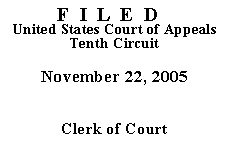 UNITED STATES COURT OF APPEALS
UNITED STATES COURT OF APPEALS
 UNITED STATES COURT OF APPEALS
UNITED STATES COURT OF APPEALS
TENTH CIRCUIT
| UNITED STATES OF AMERICA, | |
| v. | No. 04-2294 |
| TRAVIS LESTER AMARILLO, | (D.C. No. CR-04-781-JB)
(D.N.M.) |
ORDER AND JUDGMENT(*)
Before SEYMOUR, BALDOCK, and O'BRIEN, Circuit Judges.(2)
Because Defendant in his plea agreement waived his Sixth Amendment "right to have a jury determine sentencing factors," this case involves only non-constitutional Booker error. See United States v. Serrano-Dominguez, 406 F.3d 1221, 1222-23 (10th Cir. 2005). Booker severed 18 U.S.C. § 3553(b)(1) from the Sentencing Reform Act. Absent severance, § 3553(b)(1) would have required mandatory application of the sentencing guidelines apart from any Sixth Amendment error. See Booker, 125 S. Ct. at 764. Severance effectively rendered the guidelines advisory. Although prior to imposing a sentence a district court must still consult both the guidelines and the sentencing factors listed in 18 U.S.C. § 3553(a), see id. at 767, any sentence a court imposes through mandatory application of the guidelines constitutes error. See Serrano-Dominguez, 406 F.3d at 1223.
Such error, however, may be harmless. Fed. R. Crim. P. 52(a) states that "[a]ny error . . . that does not affect substantial rights must be disregarded." To that end, the Supreme Court has instructed that "'once the court of appeals has decided the district court misapplied the guidelines, a remand is appropriate unless the reviewing court concludes, on the record as a whole, that the error was harmless, i.e., that the error did not affect the district court's selection of the sentence imposed.'" United States v. Labastida-Segura, 396 F.3d 1140, 1143 (10th Cir. 2005) (quoting Williams v. United States, 503 U.S. 193, 203 (1992)).
In this case, Defendant moved for a sentence of probation. In a thorough written order, the district court denied the motion. Applying the guidelines, the court concluded (1) a downward departure was not appropriate based on the facts of the case, and (2) "[e]ven if a departure were authorized and warranted . . . , the court would exercise its discretion not to depart." The court further noted that while the question of the guidelines' constitutionality was then pending before the Supreme Court, the Court had not yet declared the guidelines unconstitutional. Although the district court decided to sentence Defendant under the guidelines, it expressed an intention to "state an alternative sentence under Williams v. New York, 337 U.S. 241 (1949)." The court subsequently sentenced Defendant to 18 months imprisonment based on a guideline range of 18-24 months. The court announced an alternative sentence "under the Williams case" of 18 months.
Defendant urges us to remand for resentencing because, according to Defendant, the sentencing scheme Booker's remedial majority crafted is narrower than the system of unfettered discretion Williams endorsed. In other words, Defendant effectively suggests the district court exercised too much discretion in imposing its alternative sentence. We are unpersuaded. Williams endorsed a sentencing scheme "under which a sentencing judge could exercise a wide discretion in the sources and types of evidence used to assist him in determining the kind and extent of punishment to be imposed within limits fixed by law." Williams, 337 U.S. at 246. While the guidelines reordered the priority of goals to be achieved through sentencing, the guidelines, like Williams, place a premium on obtaining all evidence relevant to the sentencing decision. See United States v. Wise, 976 F.2d 393, 400 (8th Cir. 1992) (en banc).
Here, the record reflects the district court considered all factors relevant to sentencing and concluded 18 months imprisonment was the appropriate sentenceguidelines or no guidelines.(1) The court heard Defendant's argument regarding the appropriate sentence and was familiar with all relevant facts. Indeed, the court expressly stated it would not sentence Defendant to less than 18 months imprisonment even if empowered to do so. We are satisfied any error in sentencing did not affect the district court's selection of the sentence imposed, and Defendant would receive the same 18 month sentence on remand. Accordingly, the district court's sentence is
AFFIRMED.
Entered for the Court,
Bobby R. Baldock
Circuit Judge
*. This order and judgment is not binding precedent, except under the doctrines of law of the case, res judicata, and collateral estoppel. The court generally disfavors the citation of orders and judgments; nevertheless, an order and judgment may be cited under the terms and conditions of 10th Cir. R. 36.3.
2. After examining the briefs and appellate record, this panel has determined unanimously that oral argument would not materially assist the determination of this appeal. See Fed. R. App. P. 34(a)(2); 10th Cir. R. 34.1(G). The case is therefore ordered submitted without oral argument.
1. Despite a district court's obligation to consider § 3553(a)'s sentencing factors, the "court is not required to consider individually each factor listed in § 3553(a) before issuing a sentence." United States v. Contreras-Martinez, 409 F.3d 1236, 1242 (10th Cir. 2005) (internal quotations omitted). Nor need the court "recite any magic words to show that it fulfilled its responsibility to be mindful of the factors that Congress has instructed it to consider." Id. (internal quotations omitted); accord United States v. Lamoreaux, 422 F.3d 750, 756 (8th Cir. 2005) ("Nothing in § 3553(a) or in the Booker remedy opinion requires 'robotic incantations' that each statutory factor has been considered.").